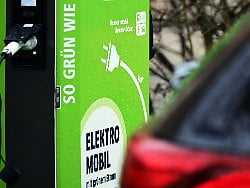Supermarkets and malls suitable
Agora: Subsidies only for profitable charging stations
02/10/2022 12:59 p.m
According to the federal government, there should be 15 million electric cars by 2030. This requires enormous support for the charging infrastructure. According to the think tank Agora Verkehrswende, this should mainly focus on fast charging stations in heavily frequented places. Those are the most profitable.
When expanding the charging network for electric cars, Agora Verkehrswende believes that the federal government should focus on fast charging. Funding should be focused on fast charging points in high-traffic locations such as supermarkets and shopping malls, emerges from a study commissioned by the think tank. These promise good utilization and are most likely to be operated profitably. Normal charging, on the other hand, should only be promoted in public spaces for selected applications such as electric car sharing.
The federal government wants to massively accelerate the expansion of the charging station infrastructure, as stated in the coalition agreement. The goal is at least 15 million fully electric cars by 2030 – that’s still a long way off.
Only 51,000 public charging stations so far
As of December 1, 2021, a total of around 51,000 publicly accessible charging points for electric vehicles were reported to the Federal Network Agency. The proportion of fast charging points was around 15 percent. A quick-charging law was passed last year that provides for 1,000 additional “quick-charging hubs”. According to the study, the expansion of the charging infrastructure must accelerate significantly over the next few years in order to keep up with the dynamic growth in electric vehicles. It is important that the charging infrastructure is always one step ahead of demand, says Christian Hochfeld, Director of Agora Verkehrswende. This requires state support: “Fears about a lack of charging options are hampering the development of electromobility and thus the achievement of climate targets in transport.”
Compared to normal charging, fast charging requires higher initial investments, according to Agora. On the other hand, easily accessible public fast charging points could sell significantly more electricity. Fewer charging points would be required for the same charging quantity. The need for space, which is scarce in urban areas, would be lower if there were a focus on fast charging.
